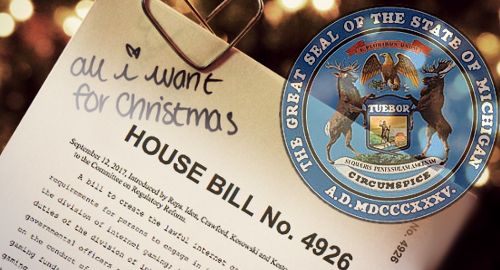 Michigan legislators are making a late run at passing intrastate online gambling legislation but the odds are heavily stacked against this attempt making any headway this year.
Michigan legislators are making a late run at passing intrastate online gambling legislation but the odds are heavily stacked against this attempt making any headway this year.
On Wednesday morning, the Michigan House of Representatives’ Regulatory Reform Committee voted 12-3 to approve the latest version of the HB 4926 online gambling legislation introduce this September by Rep. Brandt Iden.
Iden’s original bill got a hearing with the same House committee in September that ultimately led nowhere, in part due to tepid support from Detroit’s three commercial casino operators and outright opposition from the state’s tribal gaming operators.
As initially reported by GamblingCompliance scribe Chris Krafcik, the changes to Iden’s legislation include a new requirement that online gambling servers be located on casino property, presumably to address concerns that the Michigan state constitution requires casino gambling to take place “in the casino.”
Another significant change is a reduction of the online gambling tax rate from 15% to 10%, although Michigan Gaming Control Board deputy director David Murley warned legislators in September that the state’s effective tax rate could fall as low as 6% due to the likelihood of having to renegotiate all 12 of the state’s current tribal gaming compacts.
In a forward-looking move, the amended bill would also allow the state’s online gambling licensees to accept wagers on “any amateur or professional sporting event or contest, if that internet wagering is not prohibited by federal law.” The clause mirrors similar language in Pennsylvania’s recently passed gambling expansion legislation, which also anticipates imminent change in the nation’s sports betting legal landscape.
The changes were sufficient to flip the three commercial casino operators from supporting the general concept of intrastate online gambling to outright support for the amended HB 4296. The tribes remain a tougher nut to crack, while anti-gambling groups maintain that any expansion of Michigan gambling would require a voter referendum.
With just one session day left on the Michigan legislature’s 2017 calendar, it’s extremely unlikely that HB 4296 will come up for a floor vote in the House until next year. Even if momentum continues through to 2018, Michigan’s gaming landscape still has lots of moving pieces that will need to be aligned before the state can join New Jersey, Nevada, Delaware and Pennsylvania on the short list of pro-online gambling states.